-
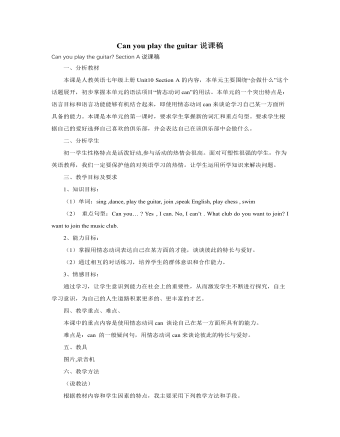
人教版新目标初中英语七年级上册Can you play the guitar说课稿
教材分析1、教材地位作用本单元围绕着学习情态动词can 的用法,来表达自己在某一方面所具有的能力。2、教学目标(知识目标、能力目标)(1)知识目标:复习情态动词can 的用法。(2)能力目标:通过学习can ,达到能灵活谈论自己的喜爱与特长,培养一种群体意识。3、重点和难点:(1)重点:情态动词can的一般问句的用法。(2)难点:利用上下文语境及略读技巧。二、教法:让学生默读课文(限时),让学生在短时内抓住课文的重点,划出关键词,从中亲自感受一下略读的技巧,然后老师加以指导。三、学情与学法针对学生在不理解情态动词can 的一般问句的情形下,反复阅读课文,从而加深对本单元前两页所学can用法的印象,从中真正感悟can的用法.
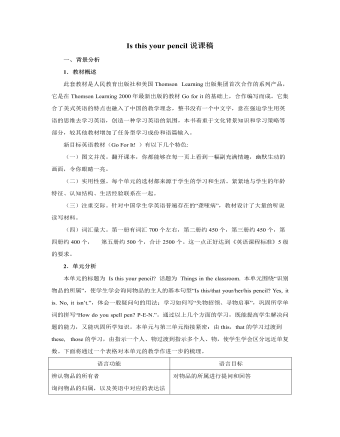
人教版新目标初中英语七年级上册Is this your pencil说课稿
教师准备利用录音使学生学习一些物品名词,并引导学生进行Pair work,学会询问“What’s this? It's a … . How do you spell watch? W-A-T-C-H.”;引导学生写“寻物启事”和“失物招领”,画图猜测物品,巩固所学内容,培养学生动脑、动手的能力及拾金不昧的精神和助人为乐、团结友爱的品德。学生准备学习一些物品名词,了解写寻物启事和失物招领的内容和格式。1. Warming up考虑到大多数学生以前学过一部分单词,可以以猜谜语竞赛的形式导出本课内容. 以pencil为例:Step1: 说出谜面, 可以用汉语解释.Our little JohnHas a wooden shirt on, And a long, sharp nose.He leaves his mark wherever he goes.接着教师画一件物品如:baseball 问学生:What’s this? 让学生使用句型 Is this a/an…?进行猜测。2. Group work学生分成四人或六人小组,将本单元的单词画出来加以猜测并评出最佳图画和最佳猜词者。3. Read ,circle and write1) Ask students to look back at page 10 . Have students read the list of the words . 2) Look at the Section B 3a . 3) Check the answers by having one student read his or her circled answers . Answers : computer game , ring , ID card , watch 4) Page 11 3b . this activity provide guided reading practice using the target language . Teacher told students that they are in the wrong order . when they are in the right order , they will make a clear message .
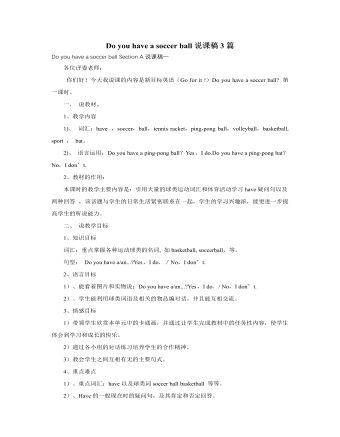
人教版新目标初中英语七年级上册Do you have a soccer ball说课稿3篇
该部分学习内容贴近学生的生活,谈论的主题是符合学生喜爱运动的心理,极易于激发学生学习英语的欲望和兴趣,使他们乐于参与各种英语实践活动。三、教学重、难点及教学突破重点学习运用重点句型Do you/they have… ? Does he/she have…? 语法难点行为动词have的一般现在时的用法;使用do和does引导的一般疑问句的构成和使用。教学突破Section A重在通过使用动词have对物品的所属进行提问和回答的交流式口语活动,学习由助动词do或does引导的一般疑问句的构成以及回答。通过大量和反复地操练以达到运用自如。教学准备教师准备收集课文中所涉及的或学生常见的球类运动器材或有关的教学幻灯片或图片;设计课后巩固练习的幻灯片;制作1a部分的插图和人物对话的课件,将听力部分的内容插人,通过询问对方的所属以及回答来引入新课。
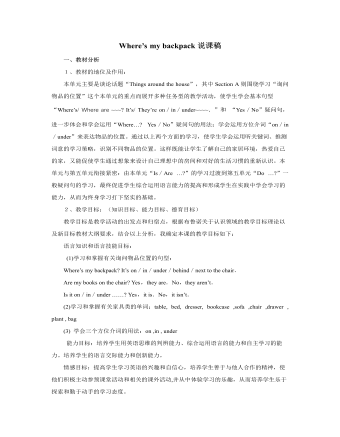
人教版新目标初中英语七年级上册Where’s my backpack说课稿
语言知识:Where is/are-----? Is it /Are they on/in/under-----? Yes, it is. / No, it isn’t.Yes, they are./ No, they aren’t.任务二:寻宝大行动活动目的:通过创设贴近生活的语言情景,学生自由选择所学的语言知识进行交流,培养学生综合运用语言的能力。活动过程:学生课前把自己最喜欢的一件东西收藏起来。以小组为单位,询问其他组员把宝物放在什么地方。规定时间内找到宝物最多者获胜。语言知识:Where is/are-----? Is it /Are they on/in/under-----? Yes, it is. / No, it isn’t.Yes, they are./ No, they aren’t.任务三:找差别活动目的:培养学生用英语思维的判辨能力,并对学生渗透德育教育:应该养成良好的生活习惯,保持房间干净整洁。活动过程:学生看两幅相似的图片,图片中有一些相同的物品,但所放的地点却不一样。以小组为单位,轮流询问有关物品所在的位置。学生记录下两幅图片中物品位置的不同,并在班上汇报自己小组得出的结果。
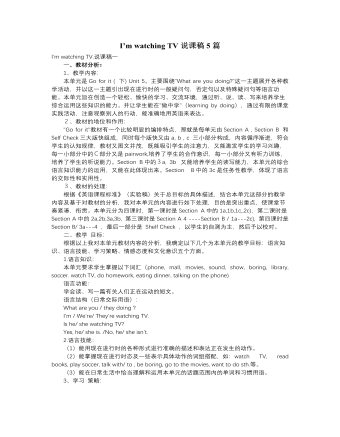
人教版新目标初中英语七年级下册I’m watching TV说课稿5篇
“Go for it”教材有一个比较明显的编排特点,那就是每单元由Section A , Section B 和 Self Check三大版快组成,同时每个版快又由a, b , c 三小部分构成,内容循序渐进,符合学生的认知规律,教材又图文并茂,既能吸引学生的注意力,又能激发学生的学习兴趣,每一小部分中的C部分又是pairwork,培养了学生的合作意识,每一小部分又有听力训练,培养了学生的听说能力。Section B中的3a, 3b 又能培养学生的读写能力,本单元的综合语言知识能力的运用,又能在此体现出来。本单元是新目标英语七年级下 Unit 5。主要围绕“What are you doing?”这一主题展开各种教学活动,并以这一主题引出现在进行时的一般疑问句,否定句以及特殊疑问句等语言功能。本单元旨在创造一个轻松、愉快的学习、交流环境,通过听、说、读、写来培养学生综合运用这些知识的能力。并让学生能在“做中学”(learning by doing),通过有限的课堂实践活动,注意观察别人的行动,能准确地用英语来表达。
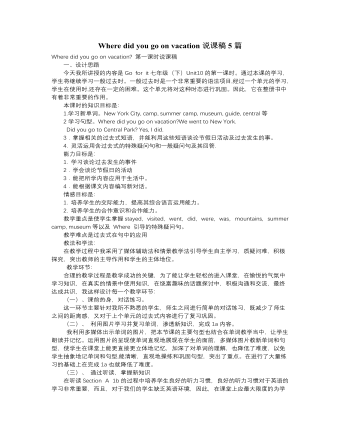
人教版新目标初中英语七年级下册Where did you go on vacation说课稿5篇
三、说教法只有当教师既在思想上把学生当成真正的学习主体,又在课堂教学过程中始终把学生当做学习的主人,教学目标才能实现,教学效率和效益才可能提高。因此课堂上加强对学生学习策略的指导是非常重要的,要使课堂教学过程成为师生共同参与,相互作用与反馈,创造性地实现教学目标的过程。另外,结合本节课内容特点,我还确立了“任务型”教学模式,并配合情景教学来实现教学目标。四、说学法课程标准倡导:教学要着眼于学生的全面成长,促进学生认知、情感、态度与技能等方面的和谐发展,着眼于学生潜能的唤醒,开掘与提升,促进学生的自主发展;关注学生的生活世界和学生的独特需要的有机结合,促进学生有个性,有特色的发展,关注学生的终身学习的愿望和能力的形成,促进学生特性发展。因此我确定本节课学习策略是:1、积极调动学生参与的积极性,指导学生感知,体验参与和合作。2、通过阅读,获取信息,并能回答相关问题。3、善于发现总结或把知识归类,按一定语言规律加以运用。
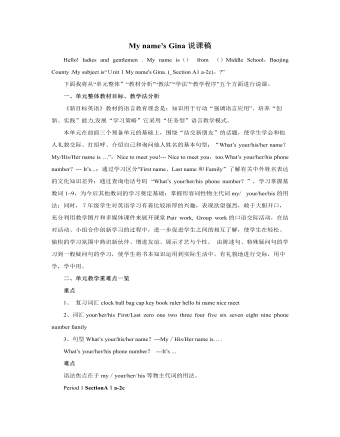
人教版新目标初中英语七年级上册My name’s Gina说课稿
1、利用插图或实物卡片让学生找出在预备篇中所学的单词,然后教师引导学习打招呼和介绍自己、询问他人姓名的基本句型。2、让学生听1a、1b对话,练习对话并模仿对话,结识班级的其他同学Step4 Practice师生互动(角色扮演) 让学生进行角色扮演1c、2c的对话,每两人一组,编对话,这个步骤主要是对1a-2b的内容进行巩固。Step5 听说活动(句型操练)1.播放2a部分的录音让学生听,引导学生通过听对话熟悉人名,完成2a,2b部分的教学任务。2.引导学生重复他们所听到的,模仿对话结识班级的其他同学,完成2c部分的教学任务。3.概括语法点Step6 知识拓展 引导学生阅读3a图中的名和姓,了解有关中外姓名的文化知识差异;从3a中给自己选一个姓、名,然后调查其他同学的姓、名,完成3b的任务。Step7 Conclusion复习本课重难点,巩固知识。Step8 Homework让学生在课后运用所学单词句型进行对话 练习。
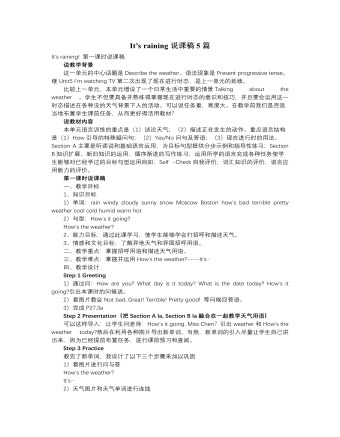
人教版新目标初中英语七年级下册It’s raining说课稿5篇
学会谈论天气情况的好坏 A B C DHow引导的特殊疑问句的用法 A B C D综合评估 A B C DA. 很好 B.较好 C.一般 D.需努力姓名 学号 评估项目及内容 评估情况单词和词组学习和运用情况 A B C D语法掌握情况——现在进行时用法及构成 A B C D学会介绍天气情况,描述天气 A B C D学会谈论天气情况的好坏 A B C DHow引导的特殊疑问句的用法 A B C D综合评估 A B C DA. 很好 B.较好 C.一般 D.需努力附表(三)学生自我检查评价表Unit6日期:姓名 班级 学号 自 我 检 查 评 价1、我会读、能听懂下列的单词和词组: 1、我还不会读、不能听懂下列的单词和词组:2、我已掌握了下列的单词、词组(习惯用语) 2、我暂时未掌握下列的单词、词组(习惯用语)和句型3、能在实际情景中运用上述的单词、词组(习惯用语)和句型 3、未能在实际情景中运用上述的单词、词组(习惯用语)和句型我准备来改善提高我的学习效率。初中七年级(下)新目标(英语)单元检测题一、听力(Listening Test)满分为20分
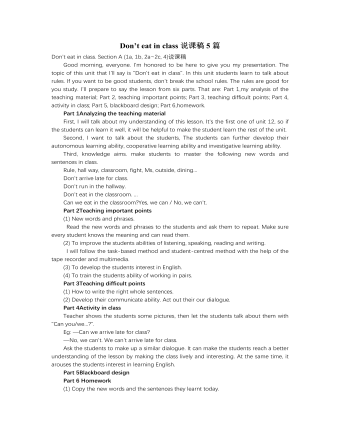
人教版新目标初中英语七年级下册Don’t eat in class说课稿5篇
TASK1. Enjoy our life.(导入新课)目的:为新课的教学作好铺垫,营造轻松的教学环境。教具:CAI操作:首先在优美轻松的乐曲中欣赏一组学生学习生活的录象,来拉开本堂课的序幕,吸引学生的注意力。以自由谈话的方式,询问学生:Do you like our school? Do you enjoy ourselves in our school?TASK2.School rules目的:用图片,以直观教学发引入School rules的教学。操作:首先通过设问,Can we listen to the music in class? Can we eat in class? 指出我们必须在合适的时间和地点做合适的事,在校我们必须遵守学校的规章制度。但是仍然有人破坏,在违规。呈现一组学生违规的图片,并问:What rules are they breaking?arrive late for class, run in the hallways, eat in the classroom, listen to the music in th classroom, fight 以此教学school rulers 并完成课文1a Match 部分教学。与此同时,在这一过程中较直观地完成 语言项目祈使句以及can表示许可的用法的介绍TASK3.Do you have clever ears?目的 :听力教学.在这里我将1b,2a,2b集中在一起教学,这样有利于训练学生的听力。
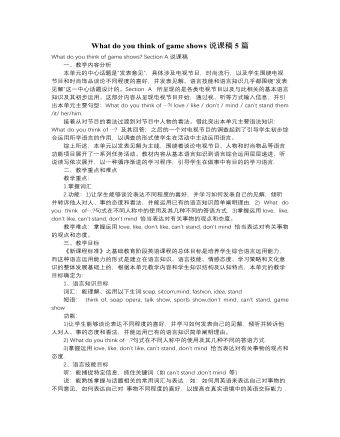
人教版新目标初中英语七年级下册What do you think of game shows说课稿5篇
步骤二 看图学单词我把本单元有关的单词制成图片显示在屏幕上。目的在于通过直观的画面效果和有意义的情景,便于学生更快地把单词的声、形和意联系起来。使学生轻松地掌握这些单词的音、形、义,且充分调动了学生的学习热情,让学生在思考中理解所学的生词。如 sitcom( situation comedy)1.猜。点击屏幕上一副有关情景喜剧的图片。说This is s kind of funny show. We call it sitcom. The people in sitcoms do or say things that make Tv watchers laugh.让学生根据图片和教师的提示猜出单词的意思。这时再告诉学生们sitcom=situation comedy.一定会有很多同学争先恐后地抢答,我们可以挑三个不同层次的学生起来回答,这样做既发挥了优等生的带头作用,同时为待优生树立起学好英语的信心,又增强了其他同学的竞争意识(他会我也会),也融入了教师的情感价值观之中。
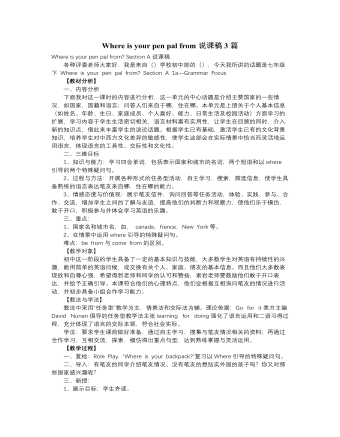
人教版新目标初中英语七年级下册Where is your pen pal from说课稿3篇
Activity3a是一篇email形式的阅读文章,并有相关问题由学生在阅读后进 行回答,Activity3b 是根据提供的信息进行填空的写作练习,Activity3c是一篇模仿写作,让学生给自己的笔友写 一封关于本人信息的email。 学情分析 本单元可以在此基础上介绍世界上主要国家的一些情况,如国旗,地理位置,重要标志物及一些重要人物。本单元是上册关于个人基本信息(如姓名、年龄、生日、家庭成员、个人喜好、能力、日常生活及校园活动)方面学习的扩展,学习内容与学生的生活密切相关,语言材料富有实用性,让学生在回顾的同时,介入新的语言点,借此来丰富学生的谈论话题。它融交际功能、语言结构于一体,包含了文化知识、任务型语言学习成分以及语篇材料等内容,通过循序渐进的生活化的学习程序,提高学生运用英语进行听、说、读、写的能力,激活学生已有的文化背景知识,培养学生对中西方文化差异的敏感性,使学生逐步学会在实际情景中恰当而灵活地运用语言,体现语言的工具性、交际性和文化性。 教学目标 1语言目标

人教版新目标初中英语八年级上册Can you come to my party说课稿5篇
二、教学设计与构思根据以上对教材的分析,同时针对学生学习外语存在一定困难的实际情况及学生的年龄特点,首先给学生营造一个温馨愉悦的氛围,创设一个接近学生生活的语言环境,激发学生的学习兴趣,让学生乐于参于以后的活动中,而且每一个环节都配有相应的动画或亲切的画面,让学生在看、听和感知中接受知识,陶冶情操。最后用清晰明了的方式总结知识要点,便于学生巩固复习。在评价学习上,采用多元化评价,尊重差异,富于感性。布置作业时,分两部分,由浅入深,照顾全体学生。三、教学文法通过五步教学法,精讲巧红,由浅入深,以学生为主体,开展师生双边活动。四、教学手段使用现代化教学手段,多媒体辅助教学贯穿整个教学过程,增加直观性和趣味性,提高教学效果。
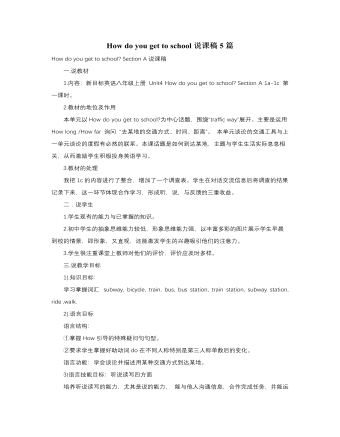
人教版新目标初中英语八年级上册How do you get to school说课稿5篇
难点:1.学会谈论并描述使用某种交通工具到达某地。2.要求学生掌握好助动词do在不同人称特别是第三人称单数后的变化。通过合作学习将听说读写有机地结合起来,切实做到任务密集度适中,节奏合理,环节与环节之间过渡自然,让学生一步步登上高峰突破难点。五.说教学策略:1.教学手段分析:针对低起点的学生,在学习过程中通过“兵交兵,小组训练,鼓励性评价”等扶路措施,提高低起点学生的语言技能。针对高起点的学生要拔高学习目标,同时又能较好地运用到实践中去。2.教学方法分析:本课主要以“任务型教学法”并辅助与情境交际法完成任务的。在教学活动中采用任务型教学法让学生的学习活动具有明确的目标,并构成有梯度的连续活动。学生从注重语言本身转变为注重语言习得,从而获得语言运用的能力。我还采用情境交际法给学生足够的听,说的机会,联系实际,创设情景,在交际中学英语。
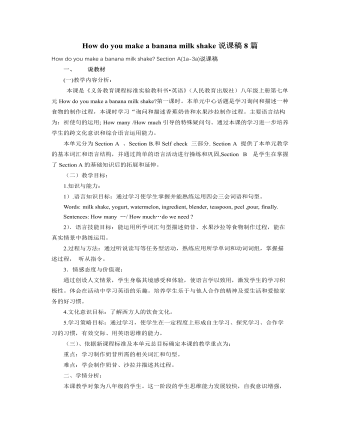
人教版新目标初中英语八年级上册How do you make a banana milk shake说课稿8篇
(五)教学过程1)在课的开始检查学生对单词短语的掌握2)1b,听力为了让学生了解香蕉奶的制作过程,让学生复述,是为了然他们用所学的重点 词汇进行练习、为后面制作水果沙拉奠定基础。3)2a2b的听力是为了复习how much 与how many的区别 ,因为七年级上册unit8涉及到的知识,所以2a2b训练的的真正目的是为了让学生更清楚的了解不可数名词的表达方式 :数词+量词 +of+不可数名词4)在学生完全弄懂事物的制作过程极其不可数名词的数量表达后,我安排他们进行制作水果沙拉的对话。这个对话是机动的,如果时间充足,我让他们按照自己的医院去选择材料进行对话的编排。这个话题既可以用到本科的重点句型,又可用到重点词汇。在这步抓住重点突出难点5)在consolidate 环节,我安排2个汉译英,4个有关how much/how many 的选择,让学生讲做题原因,让他们彻底弄懂不可数名词的数量表达。6)最后,为了加深学生对食物制作过程描述的巩固,让学生把所学知识从口落实到笔头
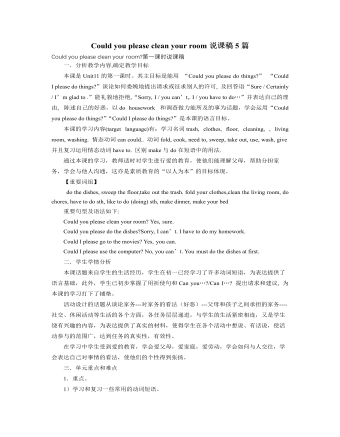
人教版新目标初中英语八年级上册Could you please clean your room说课稿5篇
三、教学准备 复习动词短语,并且预习生词, 游戏用的卡片 小奖品四、说教学方法与手段1.口语教学,在真实的语境下进行对话交际,复习旧知识,认识新事物,学习新内容。2.单词教学游戏化,寓教于乐,让学生学得开心,记得舒心。3. 利用信息沟活动,给学生设置了信息差,激发了学生的询问欲望,真正使语言起到了交流思想的作用。4.听说读写全面训练,从在听说的基础上,发展读写的技能。本节课着重写的能力,让学生从听写单词到看图写句子,由简到难,循序渐进。5.小组合作,师生对话,生生对话。五、说教材处理与学法指导1.将教材内容分为三部分。第一部分为口语操练为主,完成Section B,3,在复习旧句型的前提下学习Could you please clean your room?并能熟练进行对话。2.第二部分是听力练习,训练学生对新学单词的听辨能力和从对话中获取信息并作好记录的能力。4.第三部分是一个写的练习,是对上一节课的语法聚焦的巩固和提高,也是第二部分口头表达的延伸,是学生书面表达的起步。
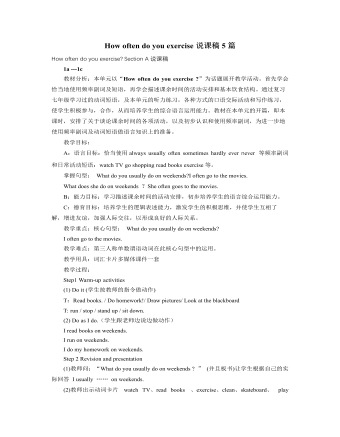
人教版新目标初中英语八年级上册How often do you exercise说课稿5篇
1a ---1c教材分析:本单元以“How often do you exercise ?”为话题展开教学活动。首先学会恰当地使用频率副词及短语,再学会描述课余时间的活动安排和基本饮食结构。通过复习七年级学习过的动词短语,及本单元的听力练习,各种方式的口语交际活动和写作练习,使学生积极参与,合作,从而培养学生的综合语言运用能力。教材在本单元的开篇,即本课时,安排了关于谈论课余时间的各项活动,以及初步认识和使用频率副词,为进一步地使用频率副词及动词短语做语言知识上的准备。教学目标:A:语言目标:恰当使用always usually often sometimes hardly ever never 等频率副词和日常活动短语:watch TV go shopping read books exercise等。掌握句型: What do you usually do on weekends?I often go to the movies.What does she do on weekends ?She often goes to the movies.B:能力目标:学习描述课余时间的活动安排,初步培养学生的语言综合运用能力。C:德育目标:培养学生的逻辑表述能力,激发学生的积极思维,并使学生互相了解,增进友谊,加强人际交往,以形成良好的人际关系。
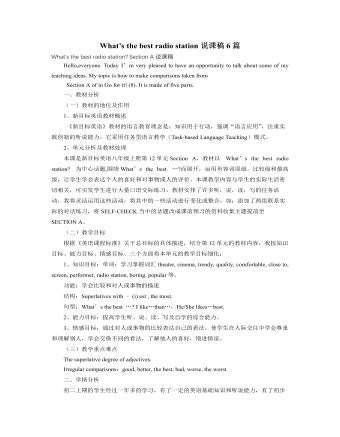
人教版新目标初中英语八年级上册What’s the best radio station说课稿6篇
3、重点和难点:重点:学会用形容词的最高级来对事物或人物进行描述。难点:形容词的最高级加est还是加most.二、 说教法:为了更好的突出重点,突破难点,我主要采用了:1、任务型教学法:新课标倡导的“玩中学,学中玩”的理念很受学生欢迎。例如,阅读文章时,我设计了一张表格,让学生阅读后完成表格并复述。培养学生逻辑分类与表述能力。2、 竞赛教学法:根据初中生争强好胜的性格特征,我每堂课都进行俩俩对话,激发学生兴趣,给学生创造外语语言氛围,培养学生集体荣誉感。三、说学法:1、 善于抓住用英语交际的机会,充分感知,积极体验,大胆实践。例如在导入新课时的One minute dialogue(每组都有一次机会),pairwork (每人都有机会),groupwork(每组一次机会)。2、 积极参与,善于合作。例如本课设计了几个任务,操作简单,学生一定很感兴趣并且积极参与,从而合作完成任务,培养了团队精神。
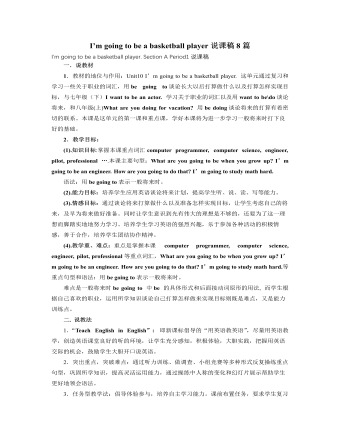
人教版新目标初中英语八年级上册I’m going to be a basketball player说课稿8篇
根据刚才调查和学生的汇报,我们很自然地可以把调查的内容汇编成一篇口头文章。为了更好的指导学生运用be going to 来进行写作,我们可以把课本上的范文给大家朗读一遍,分析如何来写My dream job.然后,可以当堂让学生模仿来进行一篇作文创造,My dream job.【设计意图】最后的写作环节是本课的提升,学生说的都不错,但落实到笔头,总是会出现这样那样的错误。如何让学生运用be going to 来进行作文创作是我们本课的重点和难点。因此很有必要当堂落实。环节6 Summary学生在老师的指导下进行课堂小结。1.重点句型:2.be going to 的用法。【设计意图】教师引导学生课堂小结,既是对文本内容的复习,又是为下节课打好铺垫,同时充分体现了学生是学习的主体地位,增强了学生自主学习的能力,可谓一举多得。
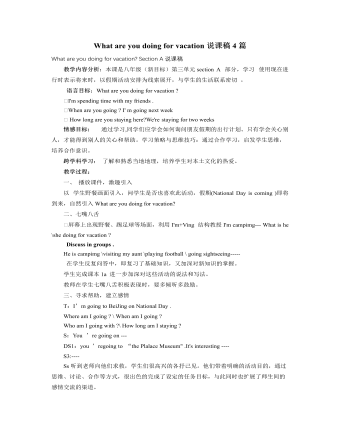
人教版新目标初中英语八年级上册What are you doing for vacation说课稿4篇
这一环节我采用电影《哈利波特》中哈利去霍格华兹的图片引入“how does Harry go to school?” 进而引入” how do you go to school?” 呈现“the ways to go to school” 让学生明确take 的使用及与交通工具的搭配。接着让学生根据实际情况回答自己采用的交通方式,期间可以引入“how does he /she go to school?” 基本了解了怎么说后进入课文,完成1a 部分练习 和1 b 的听力练习。完成后让学生玩一个数字游戏,帮学生回忆数字。通过问学生从家里出发时间和到达时间,引出“it takes ?? minutes .” 的句型。借助ppt 图片进行句型操练。然后完成听力练习2a—2c。本环节用时20分钟。While-task:本堂课的主要任务是让学生运用已学的语言知识,完成一个任务,即计算从学校到上海各种交通工具所需要的时间和费用,讨论应选用和种交通工具和各种优缺点。这一环节将用时10分钟。
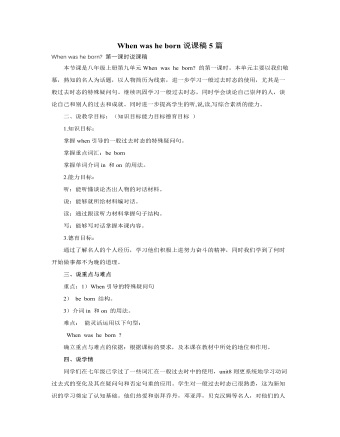
人教版新目标初中英语八年级上册When was he born说课稿5篇
1. 教学重点(1)新单词及目标语言的掌握。(2)听、说、读、写的综合训练。(3)对对合作及小组合作练习口语的训练。2. 教学难点(1)when所引导的特殊疑问句。(2)询问生日与出生年月日的区别。When is your birthday? (一般现在时)When were you born?(一般过去时) (3)表达年月日时所用的不同介词:in+年/月;on+日期二、教学方法。由浅入深,由易到难,由已知到未知,从学生熟悉的运动明星、电影明星甚至是歌手入手,调动他们的学习积极性,让他们在心情愉快、兴趣浓厚的氛围中展开一系列听说读写的训练,主动地投入到学习中去,自然地掌握本单元的重点、难点;循序渐进地深化教学内容,同时以训练学生听说为主,展开以老师为主导,以学生为主体的师生双边互动活动。三、教学手段。利用名人图片来辅助新的语言知识的巩固和训练;采用多媒体教学,并把听力内容录到电脑中,锻炼了学生的视听能力,提高了教学效果。

